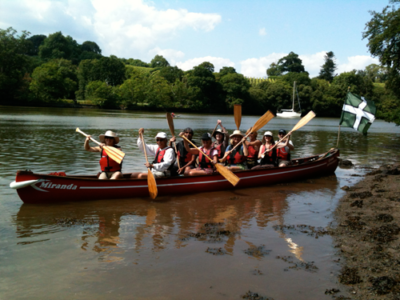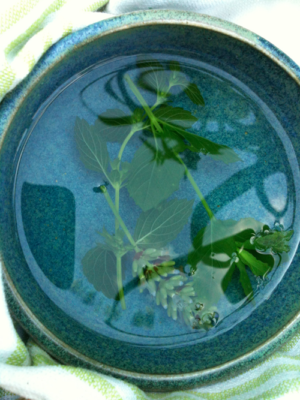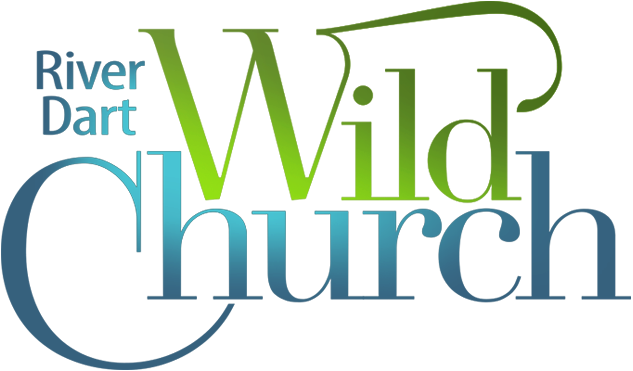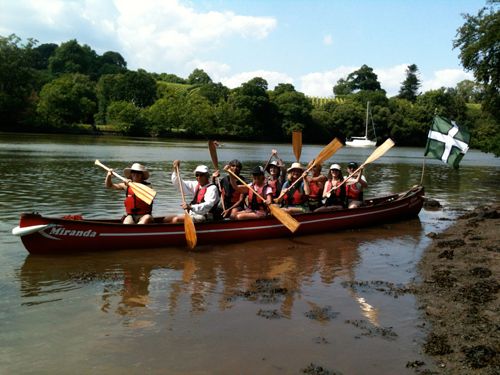
We were blessed with a perfectly sunny July day for our third canoe pilgrimage. Every year I think it can’t be any better and yet somehow it becomes more magical each time. Once again our big canoe of pilgrims set off from Tuckenhay for a contemplative day in communion with the river and her creatures. Quietly paddling & drifting we made our way to Stoke Gabriel and then returned with the tide towards a most beautiful woodland camp close to Sharpham. Here we shared food, a wild communion by the camp fire and some skinny dipping in the river before returning home. Along the way we met many wild wonders – including leaping fish, a curious seal and white egrets in the dark river mud…
I am particularly appreciating how this year seems to be inspiring pilgrims in their own creative writing and reflections. This time we have the following thoughtful and honest words from Claudius van Wyk, Director of Transformation Stategies, who draws inspiration from holistic science and deep ecology:
Revelations on a Canoe Pilgrimage
‘Sawubona’ is an African greeting meaning; ‘I see you’. The typical response’ ‘Ngikhona’ means; ‘I am here’. In our frenetically paced technological world this is an invitation to presence, and the meaningful relationship that it potentially enables. That in turn opens the door to ‘spiritual’ connection.
Yesterday a twenty year cycle came to a new point of resolution for me. Standing in a circle around a fire I received a cup of herb tea presented with deep eye contact from the person on my right, and then endeavoured to pass it to the person on my left with similar mindfulness. I think there’s a native American aphorism inviting us to see each other ‘as if for the first time, that we might have the awe, and as if for the last time, that we might have the respect’.
My story begins on a Sunday morning in the nineties with visit to Cambridge in England. I visited Christ’s College at Cambridge University where my intellectual and philosophical; mentor, Jan Christian Smuts, studied law a little over a century previously. From Christ’s College chapel came the sounds of young voices singing the hymn; ‘To be a Pilgrim’. Those words were composed by John Bunyan, and they were inspired by Hebrews 11:13: “…and confessed that they were strangers and pilgrims on the earth.” Bunyan completed his well-known ‘Pilgrim’s Progress’ in 1684.
Now, twenty year later, we were standing in a wood above the Dart River estuary taking ‘holy communion’… The Eucharistic wine had been substituted by tea, made from fresh herbs from (the) garden, now heated on the fire, and the bread had been substituted by (garden) berries.

The original Greek word for holy communion, and this is the experience that bridges that 20 year span for me, is ’eucharistia’; ‘thanksgiving’. Back then in Cambridge I discovered that Faure’s loved ‘Requiem’ would be performed at choral evensong. But what I thought would be a concert, turned out to be a full service, and in the famous King’s College Chapel. That was going to include ‘taking mass’. Whilst I had been brought up in the Christian tradition, I had never participated in the ritual. Somehow ‘eating the body and blood of Christ’ made no sense – at least until then. But later that evening in Cambridge, to the rich and compelling sounds of the ‘Agnus Dei’ from the Requiem, I found myself ‘lifted up’ in response to the invitation to come forward. Bemusedly I joined the queue. What was I doing there?
What I shan’t forget is the loving gaze of the young acolyte as she offered me the sacred bread. This was an authentic ‘Sawubona’ – ‘I see you’, experience. Prophetically, I had that significant experience under the magnificent fan-vaulted ceiling of King’s College Chapel that architecturally emulates a forest canopy. Now, in the real forest on the banks for the Dart River over twenty years later, I gazed into the gentle eyes of the young woman presenting the cup to me.
I was reminded of the words of Marcel Proust who suggested:
“The real voyage of discovery consists of not seeking new landscapes but in having new eyes.”
That seems to be the message of the Wild Church: the opportunity to begin to experience the sacredness of all being. So ten of us paddled a canoe together in silence through the gently rolling Devon countryside. Now and then simply drifting with the current, hearing the bird call with new ears – and the rhythmic flapping of the wings as they took off from the water. Someone said beauty itself shaped the human ear in order for it to be heard. And we saw with new eyes a seal watching us intently, and noticed the slowly decaying ribs of old fishing wooden vessels in which generations of fishermen had once made their living on the river. It was about seeing anew, as Proust had suggested. And had not St Paul prophesied;
“For now we see through a glass, darkly; but then face to face: now I know in part; but then shall I know even as also I am known.” (Corinthians 13:12) That’s an ‘Ngikhona’ moment – ‘I am here’.
There was something profound for me about that pilgrimage on the river. We set off from the quaint hamlet of Tuckenay and paddled through to the picturesque village of Stoke Gabriel. As we approached the village from the waterside the first feature to notice was the 13th century church. Here, just a few years previously, I had enjoyed the privilege of singing with a locally assembled choir in a performance of that same Faure Requiem. Consequently, that wonderful music also spanned the twenty years from Cambridge to Stoke Gabriel.
Writer Maria Popova refers to Bertrand Russel’s essay, written at the ripe old age of 81, comparing the process of graceful ageing to a river. She shows how he placed at the heart of a fulfilling life, the dissolution of the personal ego into something larger. Russell wrote:
“Make your interests gradually wider and more impersonal, until bit by bit the walls of the ego recede, and your life becomes increasingly merged in the universal life. An individual human existence should be like a river — small at first, narrowly contained within its banks, and rushing passionately past rocks and over waterfalls. Gradually the river grows wider, the banks recede, the waters flow more quietly, and in the end, without any visible break, they become merged in the sea, and painlessly lose their individual being.”
More recently I have read the book ‘Pilgrimage to Emptiness’ written by a physicist friend, Shantena Sabbadini. He reconsiders reality through the lens of quantum physics. At first the concept of emptiness seems strange. Now it might just be a little less so. Years back, at my favourite meditation centre established by a radical Catholic monk near Pretoria, we would follow the Aramaic mantra ‘Maranatha’, meaning ‘O Lord Come’, with the further words; ‘Empty me of myself – fill me with Thyself. What then is this ‘pilgrimage to emptiness’ – and with whom are we filled? There seems to be something here beyond the dissolution of the ego as suggested by Bertrand Russell.
I think for me it’s an invocation of a new quality of consciousness, one informed by the spirit of the whole. Traditionally that would be called the ‘holy spirit’. I have on occasion been compelled to acknowledge that my aspirations to deeper understanding have exceeded my intellectual capacity – and often motivated by the need for esteem. More disturbingly, I have had to acknowledge that my ethical insights and aspirations have not been matched by my words and deeds. As St Paul says:
“Though I speak with the tongues of men and of angels, and have not charity, I am become as sounding brass, or a tinkling cymbal”. (Corinthians 13:13)
Still, I do want to follow that deeper aspiration – to nurture the source of it. How then does that new quality of consciousness come about? I am reassured by Jesus’ parable of the prodigal son. The young man demands his ‘portion’ from his father and sets off to a ‘far-away place’ do his own separate thing – presumably a condition of non-union. That separation brings no satisfaction and he decides to make the pilgrimage home. But now he will no longer claim any familial rights and will willingly offer himself as a servant. The story continues that his father saw him coming a long way off and went out to greet him and take him home to celebration. Having experienced isolation, he now appreciates the meaning of union. For me there is something profound about that ‘act of grace’, as an implicit systemic recognition of his intention to undertake the pilgrimage to the place of union. Also profound is the loving guidance provided on the rest of his journey. The ‘whole’ knows its parts.
And I also wonder whether his pilgrimage did not really only begin when he made a conscious decision to return, but rather that it had already begun when he ‘left home’. You see, it’s about a conscious choice. But what does that look like for us in the 21st century? Certainly, to some extent, we’ve all been distracted into the world of appetite for material gain and acclaim – that’s the ego stuff Bertrand Russell talks about – like my need for esteem. But it cannot satisfy the deeper longing. That is why St Paul admonishes:
“…Be not conformed to this world: but be ye transformed by the renewing of your mind…” (Romans 12:2)
Whilst that does sound like an invitation to a shift in consciousness, still how do we escape the tyrannical trap of institutionalized materialism as characterising the prevailing world ethos? Even in his prayer on behalf of his disciples from the cross Jesus refers to them being ‘in the world but not of the world’. (John 17: 14)
I think it was Joseph Campbell who described ‘eros’, as that longing for something other which is seemingly never satisfied. Hence it is so open to economic exploitation. Campbell says that ‘eros’ is the ‘persona’s’ longing for the ‘soul’. And for me the soul’s pilgrimage is about the deeper spiritual experience of reconnecting with the great evolutionary flow of life. And I recognise that that great river must surely also be flowing through all my fellow pilgrims, whether aware of it or not. So, in a way, the opportunity of us participating together in the canoe pilgrimage began to help me reconnect with that flow. No mechanics, no electronics, no need clever ideas – just about learning, and allowing to be in loving presence and awe.
Evolution takes all in its way along with it in its flow like a great moving glacier, including the ‘stuff’ of this world. But it is flowing in a greater cosmic topography – a divine chreode. Its wisdom is not only of the past, but of an immeasurable future, and we are its offspring, and its heirs, and its agents in the revelation of an infinitely deeper quality of Personhood. And so, the quality of our presence together, in the fuller appreciation of this glorious God-given living milieu, reconnects us individually with the collective, and ultimately cosmic, pilgrimage.
“There is one ultimate Whole with ascertainable character, and human personality is the most highly developed form and function of this whole. Our human ideals of thought, conduct and faith follow from the nature of that Whole, and find in terms of that nature their true expression and explanation.”
Jan Christian Smuts – from the paper ‘An Enquiry into the Whole’ (1912).

